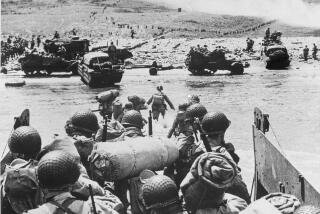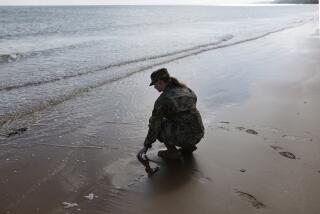Obituaries - May 9, 1999
- Share via
Maj. John Howard; Led D-Day Landing
Maj. John Howard, 86, the British commander of the first Allied forces in World War II to land in Europe on D-day. Howard’s 180 infantrymen from the Oxford and Buckinghamshire light infantry flew into France in three gliders just after midnight on June 6, 1944. Their objective was the Pegasus Bridge over the Orne River and the nearby Caen Canal. They liberated their objectives and held on until they were relieved later that day by Allied troops making their way inland from the invasion beachheads at Normandy. Howard was awarded the Distinguished Service Order for gallantry, Britain’s second-highest military honor, and France’s Croix de Guerre with Palm. After the war, Howard went into agricultural sales, living in the village of Burford near Oxford. The major’s achievements were recorded in the 1962 movie “The Longest Day.” The role of Howard was played by actor Richard Todd, who as a lieutenant during the war parachuted into France and joined the Ox and Bucks at the Pegasus Bridge. Howard was a popular commander with his men. “Major Howard was airsick every single time he went in a glider,” said a soldier who served under Howard, “but that was the one and only time he was not airsick. . . . He had the responsibility of starting the greatest military operation in military history. And he was certainly up to it.” On Wednesday at Royal Surrey County Hospital in England. Cause of death was not announced.
Louis R. Ross; Developed Taurus for Ford
Louis R. Ross, 67, former vice chairman of Ford Motor Co. who presided over the development of the Taurus, the car that played a major role in Ford’s rebound in the late 1980s. Ross came to Ford in 1955 as a research engineer in its automotive safety department. He was credited with turning around Ford’s Saline parts plant and tractor division. He oversaw the car product development group from 1979 to 1982, one of the auto maker’s most difficult periods. In that capacity, he oversaw the production of the first Taurus sedan, which was instrumental in bringing Ford back from financially troubled times. The Taurus, conceived in 1979, was a risk, costing $3 billion to develop. But the sleekly styled car was a hit with consumers and helped Ford surpass General Motors in the large-car market in the late 1980s. Named head of North American operators in 1985, Ross focused on improving quality. He believed that Detroit auto makers could no longer turn out poorly assembled cars because overseas car makers, particularly in Japan, put the emphasis on getting it right in the factory. He was named executive vice president and chief technical officer in 1991 and was promoted to vice chairman in 1993. He retired in 1996. On Sunday in Naples, Fla.






